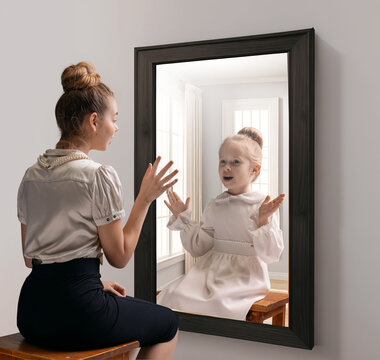
Have you ever noticed how children seem to have an uncanny ability to mirror our emotions?
It’s as if they have an invisible radar that picks up on our feelings and responds accordingly.
As a Neuro-Emotional practitioner, our Naturopath Nathan Forbes delves into the intricate connection between a parent’s emotional state and their child’s behavior.
Let’s explore how your little one might be acting out to reinforce the emotions you’re experiencing, both positive and negative.
Positive Reflection: Joy and Excitement
Imagine a scenario where you’re bubbling over with joy and excitement. Perhaps you’ve just received fantastic news or accomplished a personal goal. In this state, your child picks up on your infectious energy and mirrors it back to you. They may bounce around the room, giggling uncontrollably, and radiating the same exuberance you’re feeling. Your positive emotional state becomes a catalyst for their joyful behavior, creating a beautiful cycle of happiness and connection.
Negative Reflection: Stress and Anxiety
Now, consider a situation where stress and anxiety weigh heavy on your shoulders. Maybe you’re overwhelmed with work deadlines or grappling with personal challenges. Your child senses the tension in the air and responds by acting out in ways that reinforce your feelings of distress. They might become clingy, defiant, or exhibit attention-seeking behaviors, unknowingly mirroring the anxiety they perceive in you. This reflection can intensify your own negative emotions, creating a cycle of stress that affects both you and your child.
The Empowering Shift: Awareness and Compassion
Understanding the dynamic interplay between your emotional state and your child’s behavior is the first step towards fostering a more harmonious relationship. Instead of viewing challenging behaviors as mere disruptions, see them as valuable clues to your own emotional landscape. Take a moment to pause, breathe, and tune into your feelings. By cultivating self-awareness, you can begin to recognize the subtle ways in which your emotions influence your child’s reactions.
Approach these moments with compassion, both for yourself and your little one. Remember that children are sensitive beings who are deeply attuned to the emotional atmosphere around them. Rather than reacting impulsively, respond with empathy and understanding. Validate your child’s feelings while gently guiding them towards more positive expressions of emotion.
The Power of Positive Reinforcement
As a parent, you possess a profound influence on your child’s emotional development. By prioritizing your own well-being and modeling healthy coping strategies, you empower your child to navigate their own emotions with resilience and grace. Celebrate moments of joy together, reinforcing positive behaviors with love and encouragement. And during times of challenge, offer a comforting presence and a reassuring voice, providing a safe haven for your child to express themselves authentically.
Building a Better Relationship
So, how can you cultivate a deeper connection with your child amidst the ebb and flow of emotions?
Quality Time: Set aside dedicated time each day to engage in activities that foster bonding and connection. Whether it’s reading together, going for a nature walk, or simply having a heart-to-heart conversation, prioritize moments of undivided attention.
Active Listening: Practice active listening by tuning into your child’s thoughts and feelings without judgment or interruption. Create a safe space for them to express themselves openly, knowing that their words are valued and respected.
Empowerment Through Choice: Involve your child in decision-making processes whenever possible, empowering them to assert their autonomy and independence. Offer choices within appropriate boundaries, allowing them to exercise agency and ownership over their actions.
Consistent Boundaries: Establish clear and consistent boundaries that provide structure and security for your child. Communicate expectations effectively and enforce limits with love and empathy, helping them develop a sense of responsibility and self-discipline.
Express Affection: Shower your child with love, affection, and praise on a daily basis. Express gratitude for their unique qualities and celebrate their achievements, nurturing a sense of confidence and self-worth.
By implementing these strategies, you can cultivate a nurturing environment where mutual respect, understanding, and love flourish. Remember that building a strong relationship with your child is an ongoing journey filled with ups and downs. Embrace each moment with an open heart and a willingness to grow together, knowing that your bond is a precious gift that will endure the test of time.
Take the Next Step
Are you feeling concerned that your emotional state might be impacting your child? Perhaps you’re curious about how Neuro Emotional Technique (NET) could support both you and your little one. If you find yourself with these questions or any uncertainties, know that you’re not alone.
Nathan, our dedicated NET practitioner is here to provide guidance, support, and personalized solutions tailored to your unique needs. Whether you’re seeking clarity, relief, or a deeper understanding of how your emotions influence your child’s well-being, he’s ready to accompany you on this transformative journey.
Don’t let doubts or worries hold you back. Take the proactive step towards enhancing your emotional well-being and strengthening your relationship with your child.
Get in touch with Nathan, by calling 0425292839, or by booking online.

